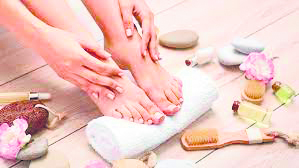
Winter can be particularly harsh on your skin, and one common issue many people face is cracked heels. Cold temperatures, low humidity, and dry air can contribute to dry and cracked skin on the feet. Here are some tips to care for cracked heels during the winter:
Hydration is Key:
Keep your body well-hydrated by drinking plenty of water. Hydrated skin is less prone to dryness and cracking.
Warm Water Soaks:
Soak your feet in warm water for about 15 minutes to help soften the skin. You can add a few drops of moisturizing essential oils like lavender or tea tree oil for added benefit.
Gentle Exfoliation:
Use a pumice stone or a foot file to gently exfoliate the dry and dead skin from your heels. This helps to smoothen the skin and improve the effectiveness of moisturizers.
Moisturize Regularly:
Apply a thick, moisturizing foot cream or petroleum jelly on your feet daily, especially after a shower or before bedtime. Pay extra attention to the heels and any areas with cracks.
Wear Moisture-wicking Socks:
Choose socks made of natural, breathable materials like cotton or moisture-wicking fabrics to keep your feet dry. Avoid wearing tight or ill-fitting shoes.
Use Humidifiers:
Place a humidifier in your room to add moisture to the air. This helps prevent the air from becoming too dry, which can contribute to cracked heels.
Avoid Hot Water:
While it may be tempting to soak in hot water during the winter, hot water can strip away natural oils from the skin. Stick to lukewarm water for foot soaks and showers.
Olive Oil or Coconut Oil Massage:
Massage your feet with natural oils like olive oil or coconut oil. These oils are rich in nutrients and can deeply moisturize the skin
.
Protect Your Heels at Night:
Before going to bed, apply a generous amount of moisturizer on your heels and wear socks to lock in the moisture overnight. This helps in healing and preventing further cracking.
Consider OTC Products: Over-the-counter heel balms or creams containing ingredients like urea or lactic acid can aid in exfoliation and moisturization. Consistency is key when it comes to caring for cracked heels in winter. By incorporating these tips into your routine, you can help prevent and alleviate the discomfort associated with cracked heels during the colder months.















